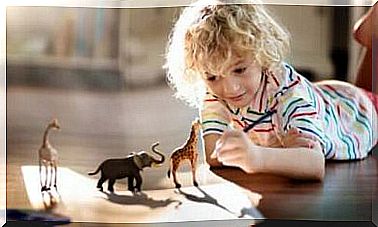How To Stimulate Scientific Thinking In Children

Stimulating scientific thinking in children has enormous benefits, not only academically but also in their daily lives and personal development. The ability to reason and use logic will help them solve various problems they encounter in life and adapt to new situations.
When we talk about scientific thinking, we mean not only things that have to do with science (mathematics, nature, biology, technology, medicine, geometry), but also the ability to be independent and solve problems in everyday life.
Why is it important to stimulate scientific thinking in children?
As I said, it is very important to stimulate scientific thinking in our children. They are fully developed. Anything that gives them cognitive stimulation will be very positive for their academic development and for promoting their independence.
Therefore, here we will look at the benefits for your children of stimulating scientific thinking.

- Improves learning to be able to solve problems in real situations.
- Improves the ability to observe and analyze what is happening in their environment. At the same time, it improves their ability to reason. It also promotes the ability to grasp more complex ideas and concepts.
- Develops their capacity to learn and enables them to learn strategies to arrive at their own solutions.
- Helps shape their own learning.
- Improves their perception of the environment and their relationship to the physical environment (shapes, parts, patterns, etc.).
These are just some of the benefits of stimulating scientific thinking in children. It helps them deal with and resolve difficult situations. In addition, they become better at analyzing from different points of view and this gives them a global view of the world in which they live.
What should you think about to stimulate scientific thinking in your children?
In order for you to develop scientific thinking in your children in a good way, you must take certain aspects into account. Here we look at some of them:
- Use scientific thinking in your child’s everyday life.
- Use logic to solve complicated situations.
- Contribute the skills and techniques required for your child to observe and analyze the environment and act accordingly.
- Encourage your child to make an attempt, even if he or she makes mistakes. Your child needs to try solutions, and if they do not work, he or she must change them. It is a unique opportunity to learn something when we make mistakes and we must convey this concept to our children.
Tips to stimulate scientific thinking in children
Scientific thinking helps children to relate to facts and ideas as well as cause and effect. By using some simple methods in everyday life, we can help them develop this type of thinking, logic and ability to draw conclusions.
Here are some tips to help you:
Encourage their curiosity about the world around them
We need to encourage our children to explore everything around them, to understand how things work and what they are for. This means that we must let them touch objects and let them do tests where they do their best to understand the mechanisms that set them in motion.
From a very young age, parents should allow their children to manipulate and interact with all sorts of things, including different materials, fabrics, toys, etc. Of course, this only applies as long as these things are safe.
To begin with, children will, through touch and sight, investigate the difference between objects depending on colors, shapes and sizes. At the same time, they will examine their properties and functions.
As they get older, you can introduce some experiments at home to analyze the relationship between cause and effect.
Ask questions to encourage their interest in different things
There are very curious children who ask about everything and touch everything, while others are not as curious. With the latter category, we must arouse their interest by asking them questions about the world around them. At the same time, we must encourage them to examine and find an explanation for what they do not understand.
Let them practice and try to solve the problems they encounter to stimulate scientific thinking
As long as it is not dangerous, we should let them try to find solutions on their own and follow their own criteria if problems arise when manipulating or using a thing.
It should always be done under your supervision and you must be patient and give advice, if needed.

Use play and imagination
You can create simple challenges that they will try to solve. For example, you could start a story and ask them to continue it and explain what happens to the characters, how they think, how they react and so on.
Use books to encourage scientific thinking in children
Books and stories can be a very good tool for encouraging scientific thinking in children. To begin with, read the story to them and then ask questions to develop their reasoning and understanding.
Later, when they are older, they will probably try to find the answers to all the questions they have themselves, by consulting and looking in other books and so on.
Carefully guide them in their learning
When faced with a problem that they do not know how to solve, do not give them the solution. Instead, give them clues or ask questions that lead them in the right direction while they think. In this way, it is they who find the solution.
As you can see, it is very important for parents to stimulate scientific thinking in their children. It will not only help them in academia, where it will be very important, but it will also benefit their development as independent individuals who can solve problems they encounter.
You must always remember that we as parents are their mentors and that we can with patience, love and commitment help our children to become fantastic people in all areas.









